Iranian Protesters Meet Norwegian Parliament President
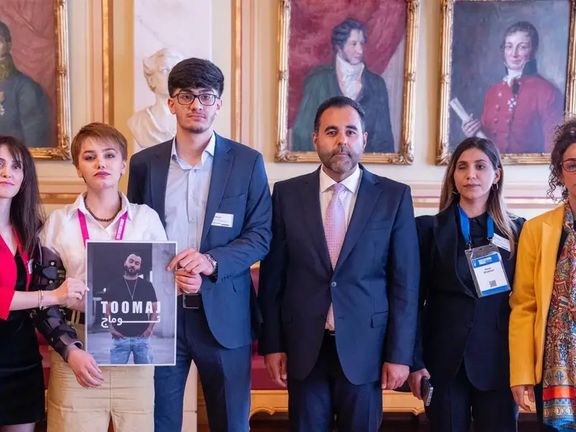
Three Iranian protesters injured during the 2022 nationwide uprising met with Masoud Gharakhani, the President of the Norwegian Parliament, in a bid to forward the plight of the Iranian public.

Three Iranian protesters injured during the 2022 nationwide uprising met with Masoud Gharakhani, the President of the Norwegian Parliament, in a bid to forward the plight of the Iranian public.
Kosar Eftekhrai, joined by Sima Moradbeigi and Zaniar Tondro, said, "We asked him to align Western countries with practical solidarity with the people of Iran and to stand on the right side of history".
The focus of the meeting was to shed light on the Iranian government's crimes against humanity including the murder of over 550 protesters in the wake of the 2022 uprising and last year's record executions of over 850. The UN has claimed Iran is imposing 'gender apartheid' as it continues to enforce brutal measures against women and girls shunning the mandatory hijab.
"The Islamic Republic is a government condemned for crimes against humanity, and we are witnesses to these crimes," Eftekhari emphasized on X.
Additionally, the trio took part in the 16th annual Oslo Freedom Forum (OFF) on Monday. At the forum, they highlighted the challenges faced by Iranian protesters, especially those who lost their eyes, and showcased the ongoing efforts of Iranian activists advocating for democracy and human rights.
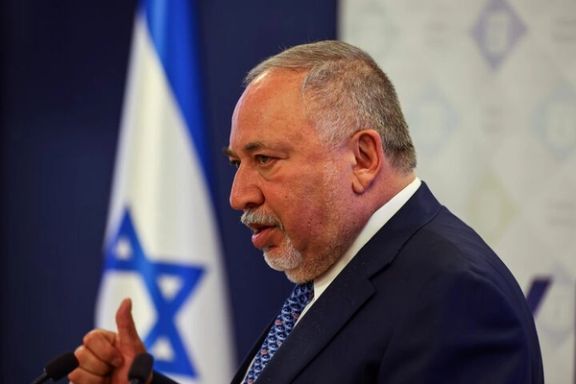
Israeli MP Avigdor Liberman has cautioned of an imminent threat from Iran, akin to a Holocaust within the next two years.
Speaking to Army Radio, Liberman asserted, "We are in the midst of an Iranian extermination program," expressing concerns over Iran's purported intention to unleash a barrage of missiles aimed at Israel.
Highlighting Iran's April 13 missile attack, Liberman emphasized the potential for a larger-scale assault in the future, suggesting that Israel could face simultaneous attacks from multiple fronts.
“Israel will be attacked with the aim of destroying it from several fronts with tens of thousands of missiles at the same time. They are planning a holocaust for us in the next two years,” he said.
In April, Iran launched approximately 350 missiles and drones towards Israel, most of which were intercepted.
A vocal critic of Prime Minister Benjamin Netanyahu's policies, opposition MP Liberman has advocated for more assertive military actions, including measures to contain Iran's biggest military proxy, Hezbollah, in southern Lebanon.
The terror group is currently bombarding Israel daily with drone and missile attacks in the worst violence since the second Lebanon war with Israel's war cabinet now debating how to respond. Since October 7, over 3,000 projectiles have been fired towards Israel.
Amid the war in Gaza, sparked by Iran-backed Hamas's invasion of Israel on October 7, Iran's proxies have since attacked the Jewish state from Iraq, Yemen, Lebanon and Syria.
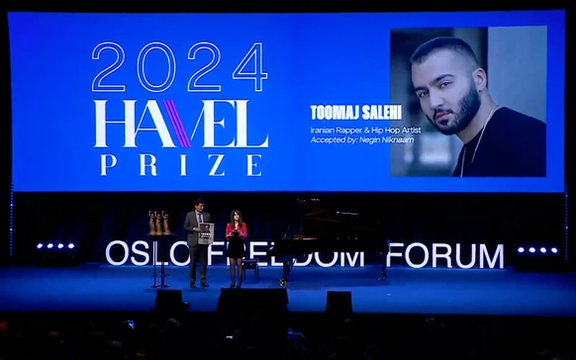
Imprisoned Iranian rapper Toomaj Salehi, who has been sentenced to death, was awarded the Václav Havel International Award at the 16th Oslo Freedom Forum in Norway's capital on Tuesday.
Salehi, an outspoken critic of the Islamic Republic, was one of the three winners of the award alongside Uyghur poet and filmmaker, Tahir Hamut Izgil and Venezuelan pianist and recording artist, Gabriela Montero.
Unable to attend the ceremony due to his imprisonment in Iran’s Dastgerd Prison in Esfahan, Salehi's award was accepted on his behalf by Iranian activist and friend, Negin Niknaam. Niknaam delivered a poignant speech, highlighting Salehi's plight and the broader struggle for freedom in Iran.
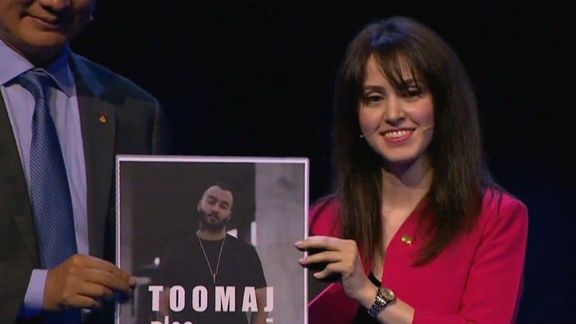
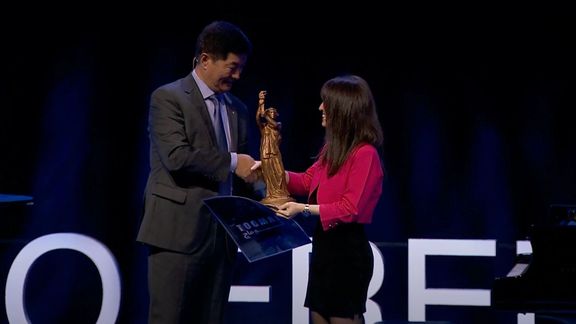
"Toomaj is not here. He cannot be here today. He sits in prison behind cold bars in Iran and is sentenced to death. The Islamic Republic wants to execute him. Why? Because he is much more than a musician. He is a beacon of hope, a symbol of resistance," Niknaam stated.
Salehi was charged with "corruption on Earth" by a court in Esfahan, after facing lesser charges. Niknaam stated that this charge “reflects the regime's fear of the courage and hope” that Salehi represents through his art.
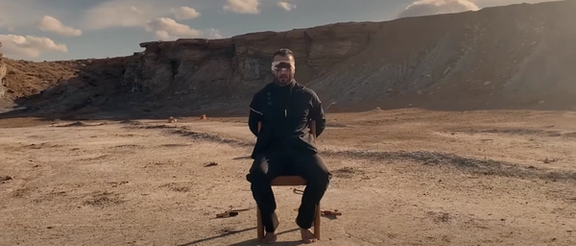
Salehi’s lawyer Amir Raisian confirmed the verdict of Salehi’s death sentence in April this year. Salehi who became an icon of Iran’s 2022 nationwide protests, released a song in support of the protestors in addition to lending his platform to echo the voices of Iranian protestors. He not only supported the protests in this manner but also joined them on the streets of Iran as security forces fired shots at peaceful protestors across the country.
This ultimately made him a target of the authorities and led to his violent arbitrary arrest, torture, imprisonment, and now a death sentence following sham trials without legal due process.
"The Islamic Republic wants to execute him because he has become the voice of a nation, yearning for freedom like the brave injured protestors…like those whose children were shot during the protests…like those brave women and men who drew their last breaths under the brutality of the security forces," Niknaam continued.
Further shedding light on the plight of Iranians, Niknam stated “despite the crackdowns, imprisonment, and executions, the movement for freedom in Iran continues to gain strength…”. However, she warned that the lack of inaction from Western countries only emboldens the regime to continue its repression, encouraging “the Islamic Republic to kill more protestors”.
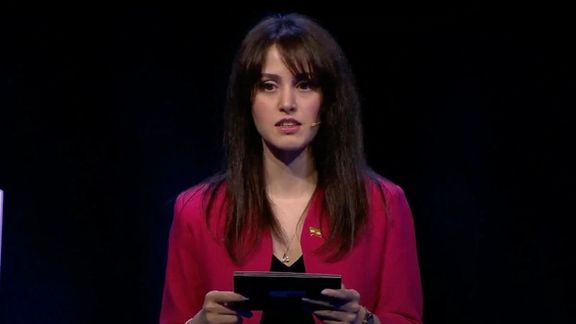
Niknaam urged the event’s attendees to raise their voices to support Toomaj until his release and emphasized that the Islamic Republic regime sometimes falls short in the face of international pressure.
Niknaam concluded her speech by echoing Salehi's words which became viral among young Iranians: "The ultimate death is the death of hope."
Salehi's cousin, Arezou Babadi, spoke to Iran International following the event, emphasizing the global impact of his courage.
"Toomaj’s unwavering courage and voice have transcended borders, making him a global icon of freedom of expression and resistance. Toomaj stands as a beacon for the voiceless, embodying the relentless pursuit of truth and justice in a world often shrouded in silence," Babadi stated.
During the past weeks, hundreds of family members of the dead and wounded in the Iran-Iraq war, civil activists, and cultural and artistic figures around the world, in separate statements, demanded the release of Salehi.
Shortly after Niknaam’s speech, Jack Dorsey, the co-founder of Twitter took to social media and wrote #FreeToomaj shortly after Niknaam’s speech.
The Václav Havel International Award recognizes those who demonstrate exceptional courage and creativity in standing up to tyranny. The Havel Prize is named after the late Czech president and former New York-based nonprofit Human Rights Foundation chairman, Václav Havel. Havel is remembered for his struggles against the communist government of Czechoslovakia. He was elected as the first Prime Minister of the Czech Republic and held power in this country from 1993 to 2003. He died in 2011.
Further reflecting on Salehi’s award following her speech, Niknaam told Iran International English:
“Toomaj's unwavering commitment to his cause makes him a deserving recipient. Toomaj’s plight and the ongoing struggle of the Iranian people serve as a powerful reminder to the world of the resilience and strength required to fight for freedom.”
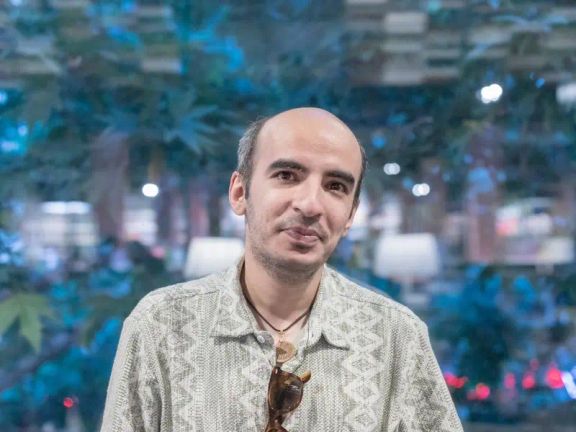
Hossein Shanbehzadeh, a translator, literary editor, and social media activist recognized for his candid critiques, has been detained, apparently for adding a dot to a tweet by Supreme Leader Ali Khamenei.
Initial speculations about his arrest surfaced when his brother, Abbas Shanbehzadeh, shared concerns on X regarding Hossein's possible detention, which was later confirmed by Hossein himself during a call.
Shanbehzadeh's X account also became inaccessible, likely deactivated to prevent misuse by security agencies. Nevertheless, his name dominated Persian-language X trends for hours, with users highlighting his wide-ranging influence and fearless commentary.
Shanbehzadeh, who posted a dot in response to Supreme Leader Ali Khamenei's tweet last month, employing a sarcastic editorial tone, saw his comment receive considerably more likes than Khamenei's original tweet.
Conversely, some cited Shanbehzadeh's criticisms, including an exposé on Evin Prison's harsh practices, suggesting his arrest stems from governmental ire towards his outspokenness.
In response to his arrest, numerous users voiced their outrage, linking it to a comment he made under an official post by Ali Khamenei last month, which gained significant traction.
Shanbehzadeh was previously imprisoned in connection with the 2019 protests, facing charges of "insulting the sanctities and the leader of the Islamic Republic."
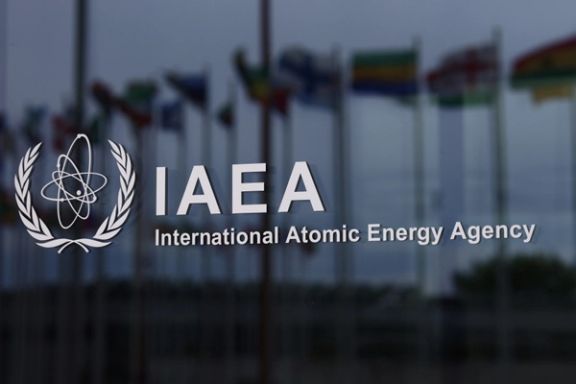
The Biden administration on Tuesday seemed closer than ever to backing a European resolution against Iran at the IAEA board meeting, after Iran showed no signs of cooperation with the UN nuclear watchdog.
Last week, the IAEA chief, Rafael Grossi, said the watchdog had lost track of Iran’s production and inventory of centrifuges and related components, as Tehran has limited access to the inspectors.
On Tuesday, the US delivered a strongly-worded statement to the IAEA, effectively opening the door to a censuring resolution at the upcoming quarterly IAEA Board of Governors meeting.
“Iran refused a deal when it was possible, continued with activities that negated the chance for that deal,” US ambassador to the IAEA Laura S.H. Holgate said Tuesday. “The idea that the remaining issues could be resolved within a few days, when Iran’s nuclear program has, and continues to, significantly expand... and when Iran’s cooperation with the Agency has reached new lows, is absurd.”
This was perhaps the clearest indication to date that the Biden administration may have lost patience with the “tired and transparent gambit” of the Iranian rulers. And a few hours later, came another indication –this time from the State Department spokesman, Matthew Miller.
“Should there be a resolution,” he told reporters who asked about the US position, “you should not expect us to act in any sort of disharmony with our E3 partners. We prize our unity with them, and I expect that to continue.”
In the past few weeks, unofficial reports have pointed to a US-E3 disagreement, with the Biden administration trying to dissuade France, Germany, and the UK from censuring Iran at the IAEA’s board meeting, fearing, perhaps, that it could lead to more hostility and further complicate the relationship with those in power in Tehran, as well as the situation in the broader Middle East.
The statements on Tuesday, however, put to rest the notion of a US-E3 disagreement, suggesting instead that a censuring resolution may be imminent.
Earlier Tuesday, the E3 said in a joint statement that Iran has chosen to escalate and to expand its nuclear program to alarming levels, calling on the Islamic Republic to halt its escalation. “Much of Iran’s nuclear program is unprecedented for a state without a nuclear weapons program," they warned.
This was echoed by the US ambassador shortly after, referring to Iran’s growing stockpile of near-weapons-grade uranium. “There is no credible, civilian justification for Iran to amass a stock of highly enriched uranium and these actions run counter to the behavior of all other non-nuclear weapons states party to the NPT,” said Ambassador Holgate.
“Twice in 2022 viable deals were put on the table after great political effort,” she added. “On both occasions, Iran responded to these deals with unacceptable demands beyond the scope of the JCPOA.”
Iran limited its cooperation with the IAEA and expanded its enrichment program after President Trump unilaterally withdrew from the 2015 nuclear deal. President Biden set it as a priority ‘from day one’ to revive that deal or craft a new agreement. The plan was to dull the nuclear ambitions of the Islamic Republic, but it only sharpened the criticism of the Biden administration –from the Republicans in the Congress, in particular.
“Iran is closer than ever to having nuclear weapons,” Rep. Mike Lawler (R-NY) posted on X Tuesday, “that's why @SenatorTimScott and I have introduced a resolution calling on the Biden Administration to censure Iran at this week's IAEA meeting.”
Iran Rejects Latest IAEA Report, Branding It 'Unreliable'
Iran, meanwhile, has dismissed a recent IAEA report regarding its nuclear activities as "unreliable."
In that report to the IAEA Board of Governors, Director General Grossi stated that there has been no progress in resolving the safeguards issues with Iran.
In a statement it labeled the latest report as "based on unreliable information and unauthentic documents," dismissing allegations of an undeclared site in Turquzabad as a mere "industrial scraps storage."
The tension over undisclosed locations began with Israeli Prime Minister Benjamin Netanyahu's remarks during his speech at the United Nations General Assembly in September 2018.
Netanyahu pointed to the location in Turquzabad, southwest of Tehran, saying that Iran has a secret warehouse for nuclear materials and equipment in this area, holding up to 300 tons of nuclear equipment and material. Iranian officials dismissed Netanyahu's claims, stating that the location mentioned is just a simple “rug cleaning” business.
The Iranian officials refuted any involvement in nuclear activities at the site, despite previous reports of nuclear materials being moved with containers from the location.
Grossi claimed in his recent report to the Board of Governors that no progress has been made in resolving non-compliance issues with Iran and criticized Iran for failing to provide “technically credible explanations for the presence of uranium particles of anthropogenic origin” in Turquzabad and a second site in Varamin.
The IAEA's repeated requests for explanations about the presence of uranium particles at the two sites have gone unanswered for years.
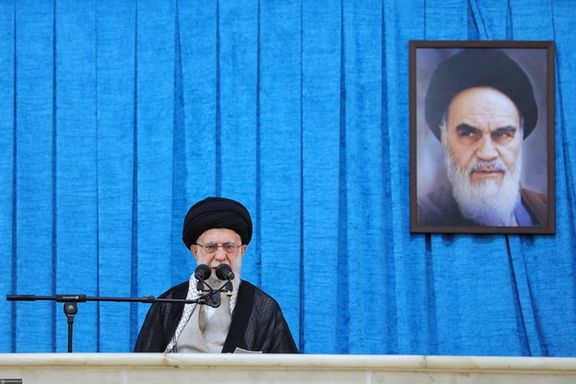
The prevailing consensus among Iranian analysts abroad is that President Ebrahim Raisi's death is unlikely to impact Tehran’s political and economic policies, as these are ultimately directed by Supreme Leader Ali Khamenei.
Previous administrations, including those of Presidents Hassan Rouhani and Mohammad Khatami, have achieved some advancements in foreign policy, suggesting a slight potential for change in this area.
During Rouhani's tenure, Supreme Leader Khamenei demonstrated flexibility by agreeing to the JCPOA. Similarly, during Khatami’s era (1997-2005), his de-escalation policy resulted in a reduction of the regime's terror activities in Europe, a move that Khamenei did not oppose.
Although elections in Iran are widely known to be engineered, some still speculate whether the next presidential administration might create an opportunity for change in foreign policy and revitalize the stagnant nuclear negotiations.
Several candidates who have registered for the election have addressed this issue, presenting foreign policy stances that differ somewhat from those of President Raisi and his hard-line Foreign Minister Hossein Amir-Abdollahian, who also died in the May 19 helicopter crash.
Ali Larijani, a close associate of Rouhani's previous administration and the Parliamentary Speaker who approved the JCPOA in just 20 minutes, has expressed the need for a shift in Iran's foreign policy direction. Should he be able to pass the Guardian Council's “filtering process”, he may be able to expedite negotiations and reduce tensions between the Biden administration and Tehran.
When Larijani registered for the presidential election, he stated that "to cross the obstacles, we have to rise above the outdated methods." Kayhan, the most hardline newspaper in Tehran, interpreted this as a critique of the Raisi administration's foreign policy. In response, Kayhan criticized the JCPOA and the influence of the US and UK, calling the agreement and the process of aligning with it "the height of humiliation; the lowest height." While Larijani was advocating for a new approach to foreign policy, Kayhan defended the current administration's hardline stance and dismissed any return to the JCPOA as degrading.
The other candidate in the upcoming election, Saeed Jalili, has previously confronted Ali Larijani over nuclear negotiations. Unofficial reports from a 2022 special meeting of the Expediency Council, which have not been denied, indicate that Jalili proposed Iran's withdrawal from the NPT. This proposal was opposed by Ali Larijani, Sadegh Larijani, and Ali Shamkhani.
Recently, nuclear negotiations have reportedly been entrusted to Ali Shamkhani, based on unofficial reports that have not been refuted. This would suggest that Saeed Jalili is not a suitable candidate to advance the state of Iran’s current foreign policy.
Should Ali Khamenei seek to continue negotiations with the 5+1, albeit not in the same manner as Saeed Jalili during his tenure as Secretary of the National Security Council, it could enhance the likelihood of Ali Larijani's qualification being confirmed by the Guardian Council. This development could also affect the council's credibility, considering its prior rejection of Larijani's candidacy in 2021. Such scenarios underscore the intricate interplay between foreign policy and domestic politics.
Former President Mahmoud Ahmadinejad has also registered to run again. Given his prior disqualifications, however, it is likely that the Guardian Council will disqualify him once more – rendering any shifts in his previous stances less impactful. Historically, Ahmadinejad opposed negotiations aimed at a nuclear deal with the United States, which led to his exclusion from discussions held by Ali Akbar Salehi, head of the Atomic Energy Organization of Iran, with American officials in Oman in 2012.
Mohammad Bagher Ghalibaf, who registered as a presidential candidate shortly after assuming the position of Speaker of the Parliament, has made numerous statements about the nuclear negotiations and the JCPOA that are inconsistent and unclear. Therefore, it is unlikely that his administration would bring about significant changes in Iran's nuclear policy.
For instance, After the Majles' general approval of the "Strategic Action to Cancel Sanctions and Protect the Interests of the Iranian Nation" Act, he stated, "The parliament gave this message to the enemies of Islamic Iran that the one-sided game is over.” However, he later changed his position, saying, "Every fair person considers the success of the diplomatic system as the basis of the country's pride," following the approval of the JCPOA.
When Es'haq Jahangiri registered as a presidential candidate, he promised to lift the sanctions on Iran. Achieving that goal, however, would require accelerating nuclear negotiations.
Jahangiri's preferred policy approach was similar to that of former Foreign Minister Javad Zarif and President Rouhani during the first and second years of Biden's presidency, which aimed at engaging in diplomatic efforts to ease sanctions. Despite their efforts, this approach faced strong opposition from Supreme Leader Ali Khamenei and ultimately did not succeed in lifting the sanctions or achieving significant results.
Regarding Iran’s now-deceased President Ebrahim Raisi, the Supreme Leader’s decision in 2021 was straightforward: Raisi was a loyal follower whose allegiance was unquestioned. That confidence led to the ultimate disqualification of several other presidential candidates, ensuring Raisi's selection.
In the current political landscape, Khamenei confronts a more intricate scenario in selecting the next suitable president. He can no longer simply support a single, loyal candidate without risking significant pushback or future complications.